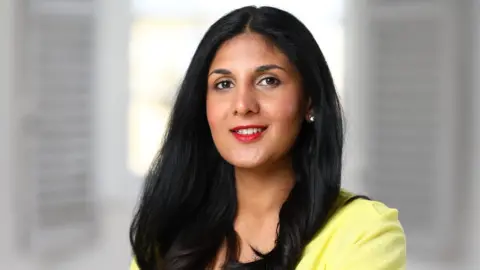Do you want to find out how much your colleagues earn?
 Vinciane Lebrun
Vinciane LebrunWhile we might discuss love and loss at work, there's one thing we generally don't share with the people we work with - how much we earn.
But at Alan, an online health insurance provider, everyone knows all their workmates' salaries.
Staff can even give an opinion on whether they think someone deserves a pay rise.
While many companies prefer keeping salaries shrouded in mystery, the founders of Paris-based, Alan, decided to create a transparent pay structure from the moment the business launched in 2016.
"We wanted everyone to be on the same page, as it's super convenient to have full transparency - it removes the mental load of having to know who should know what," says Charles Gorintin, co-founder and chief technology officer at Alan, which employs 470 people.
 Vinciane Lebrun
Vinciane LebrunIt means that new recruits joining the firm cannot haggle over pay when they join. Nor can an existing member of staff use salary as a negotiating tool if they say that they have been offered a new job somewhere else.
Mr Gorintin adds: "We don't give new joiners the salary they have had in the past, whatever their negotiation skills are."
All employees at Alan get an automatic 3% annual pay rise, but for someone to receive an additional increase it is first reviewed by their colleagues. "It's partly to be held accountable to each other, and it also helps each other grow and improve," says Mr Gorintin.
But is everyone receptive to this level of openness? "The advantage is we have a straightforward culture," responds Mr Gorintin. "People will only apply, or join, if they truly want to experience it. It might not sit well with some people."
 Getty Images
Getty ImagesWhen it comes to salaries, greater transparency appears to be a growing trend, on both sides of the Atlantic. The aim of this shift is to try to finally tackle the so-called gender pay gap, in particular.
The Organisation for Economic Co-operation and Development said last year that this gap - the difference between the pay of men and women - still stands at an average 13% across its 38 member states.
Last month, the UK government launched a pay transparency trial primarily aimed at reducing it in this country. Participating businesses will have to list a salary range on every job advert, and not ask applicants to disclose their salary history.
The Government Equalities Office said that these two things aimed to provide "a firm footing for women to negotiate pay on a fairer basis".
"Women, people of colour and disabled people are much more likely to be paid less than men. So, when you ask about salary history, past pay discrimination and bias follows through from one job to the next, perpetuating gender, disability and ethnicity pay gaps," says Jemima Olchawski, Fawcett Society CEO.
Polling from the Fawcett society of 2200 people found 61% of women and 53% of men said being asked about their salary had damaged their confidence to ask for better pay.
Across in New York City, pay transparency legislation is currently due to become law on 15 May. Firms who employ more than four employees will be required to post salary ranges, in a bid to tackle both gender and race pay gaps.
Back again in the UK, this summer the Department of Business, Energy and Industrial Strategy is set to publish guidance to employers on voluntary ethnicity pay gap reporting.
UK travel firm, Flash Pack, is another business that has now adopted a transparent pay policy. The firm, which started up again this year after having to close down during the pandemic, now puts the exact salary offered on its job adverts.
This is instead of its previous practice of only saying that the pay was "competitive", and then negotiating with a new recruit from there.
Radha Vyas, chief executive and co-founder, says that the new policy saves a lot of time, as they no longer get applications from people who expect to be paid a lot more than the company could offer.
 Radha Vyas
Radha Vyas"What we found previously was... we'd get really great candidates, but they'd be really far apart on salary expectations."
Ms Vyas adds that the pandemic gave the company time to reflect on this problem.
"We also realised that, through salaries, we were perpetuating the gender pay gap. We felt we were a generous employer, but suddenly we could see a disparity amongst colleagues.
"What it meant in my previous experience of hiring was that some people are better at negotiating their salary."
London-based, FlashPack, has worked with a human resources company called Justly to help set salary benchmarks within the company.
"Now everyone knows each other's band but they don't know each other's exact salary," says Ms Vyas. "We wanted to pay everyone fairly... now we can't just hand out pay rises.
"Doing this is very hard work, there's no flexibility to overpay and underpay people. We're now at 14 staff so we're doing it now before we grow bigger."
 Getty Images
Getty ImagesMelanie Folkes-Mayers, founder and chief executive at HR consultancy Eden Mayers, says there are benefits to including exact salaries, or salary brackets, on job adverts.
"It cuts out so much waste," she says. "For example, instead of having 200 applicants apply for a job, a firm might end up with 50.
"But it can be very grey area, as some companies bring in people hand-picked by a recruiter and ask them what their salary expectation is," she says.
"I think it will get to the stage where companies will be more transparent, but more likely to see a grading system with a salary of between this and that."
Ms Folkes-Mayers does however question if people will want to have their salaries divulged. "In the UK, we're so private about salaries. I'm not sure how comfortable everyone will be knowing what everyone else earns.
 Getty Images
Getty Images"But it is a positive move, and helps the gender pay gap. The challenges are for smaller companies, especially when they might have headhunted a particular person.
"Sometimes some organisations say to me 'can we stop people from talking about salaries?', but people will inevitably talk, they become friends. I say if you're concerned they're going to talk, and you know there is disparity, that can be overcome through either freezing some salaries while making a conscious decision to increase certain others every six months."
Although in the UK there's no general legal requirement on employers to be transparent about pay, whether in job advertisements or otherwise, Philip Landau, employment lawyer at Landau Law, points out that there are two statutory provisions which touch on aspects of pay transparency.
The first relates to "pay secrecy clauses" in a contract of employment, he says. "These clauses are unenforceable to the extent that they seek to prevent an employee from discussing or disclosing pay when trying to identify potential pay discrimination.
"The second statutory provision only relates to employers with a workforce of 250 people or more. Such companies are required to report on their gender pay gap."


New Economy is a new series exploring how businesses, trade, economies and working life are changing fast.

These businesses have to upload data such as gender pay gap in basic hourly pay, gender pay gap in bonuses, and the proportion of men and women who get bonus payments, to a government website.
"It also needs to be published on the employer's own website in an accessible place, together with supporting narrative on the accuracy of the calculations," adds Mr Landau.
Ms Vyas says she has already seen the benefits of pay transparency, and urges other companies to step up and do the same. "If you really care about diversity you have to do it. You can't do it without doing this work."

Do you want to know how much your colleagues earn? What are your experiences? Please email [email protected].
Please include a contact number if you are willing to speak to a BBC journalist. You can also get in touch in the following ways:
- WhatsApp: +44 7756 165803
- Tweet: @BBC_HaveYourSay
- Upload pictures or video
- Please read our terms & conditions and privacy policy
